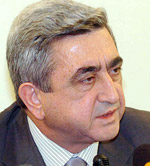During his exclusive interview to Russian “Nezavisimaya Gazeta”, Serge Sargsyan spoke about the campaign, foreign policy, and the internal situation of the country.
– The Republican Party, which you head, should perhaps not have any problems during the campaign. What are the chances of the opposition parties during elections?
– I can already predict the results of the coming elections, as there are various sociological organizations, which conduct sociological polls. But I wouldn’t like to speak about those predictions in order not to let the oppositionists blame the government for predicting the outcome of the May 12 elections. In my opinion, the positive thing is that the pre-election environment in Armenia is quite normal (it wasn’t like that before). Most of the political parties are quite tolerant to each other, which is a positive fact. I don’t think there are going to be only two or three parties elected in the Parliament.
– It’s known that after the Constitutional Referendum, the winner of parliamentary elections gets an opportunity to regulate the branches of power. Will this not lead to the fragmentation of the internal situation?
– If we receive a great percentage of support from voters, we will be enabled to form our government, which will consist of representatives of various political forces. We have great experience in forming a coalition government. . Of course some forms of that government I don’t personally approve of, but it’s the most progressive one. There are opinions that coalition governments are not effective, but I don’t think so. If we are successful during the elections we will form a coalition government and the forces will all reconcile with each other.
– In neighboring Georgia and Ukraine, revolutions took place right after elections. Do you see such prerequisites in Armenia?
– Theoretically everything is possible, but not practically. The government is disposed constructively. They desire free and fair elections.
– What’s your viewpoint about the opinions that you are the most predicted as the next president of Armenia?
– If that’s the opinion of the majority, then positively. In fact I have mentioned in past that I’ll think about the nomination of my candidature for the presidential elections only on May 13. If the Republican Party gets the majority of votes, I’ll start to think about running for the office of President. But if the support is only 10-15% then there is no need to be nominated, because it won’t be possible to change the situation within several months. That’s the reason we place high importance in the parliamentary elections.
– You often emphasize that the signing of the main document of regulation of the Karabakh conflict is your main goal. How do you envision that, considering the substantially different standpoint of Azerbaijan?
– I mean the peace treaty, in the result of which the two sides must refuse applying military means. If the treaty is signed, the governments of the two countries will work on reconciling the two nations.
– Relations with Russia don’t seem very troublesome. However, very often in Yerevan you hear people complaining that the factories or branches of industry, which were given to Russia to acquit state debts, don’t function, and in Russia they say that those factories are not valuable at all. What’s your opinion?
– That’s not new to me. But the authors of such statements don’t have a very thorough approach to these problems. The process of giving those factories to Russia is not the same as a transaction between two people when someone is trying to sell something to the other one. Everybody knows that both of the countries have speculated and planned a lot about the process before it was launched. The idea of signing such a contract wasn’t originated because of Armenia’s debts. Russia has issued a waiver to many other types of debts to many states, which haven’t been very loyal to Russia. I have been among the initiators of those contracts and still remain the chair of the intergovernmental commission. I had a goal to bring Russian capital to Armenia. It was a priority for us because we think that foreign investments can revive the Armenian economy. There is also another approach. We have an objective to modernize our industry. We gave those productions to Russia several years ago, however not a single ruble was invested in those. How can those be efficient productions now? Those productions used to be connected with the Russian ones. By giving those to Russia we found it expedient to develop those. I am sure that those productions can be profitable and Russia’s high-ranking officials are aware of this. I’d like to add something and say that the Armenian government is willing to create the necessary conditions for that. Armenia has never wished to live at the expense of others; we never wanted to have more than what we could actually afford. Recently Sergey Ivanov visited Armenia. We have spoken about that issue and I believe he will find smart ways for the resolution of this problem.
– Recently it feels like Armenia is being pressed by the States and Europe, however this pressure is not yet direct. Is this in fact the case?
– No. I have been a member of government for many years and cannot remember a case of such pressure on the part of the US. Our relations with the West are developing dynamically. The US is showing serious economic support to us. Armenia receives more aid from the US per capita than any other country, except for Israel. Besides that, the US government is helping us develop our infrastructure. I’d like to add that Armenia would never benefit from the conflicts, which exist between Russia and the US. I think our 15-year-old history proves that. Of course certain conflicts of interests arise, but those don’t last long. However we won’t let anybody put pressure on us.

